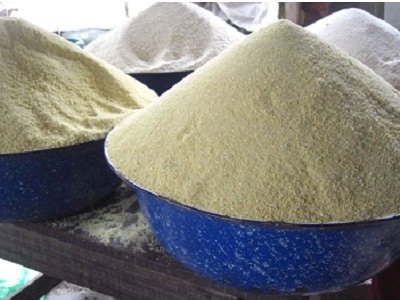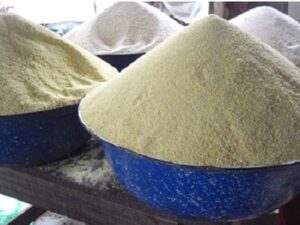
Despite gov’t intervention, price of garri soars in Akwa Ibom
Garri, which sold N500 for four cups in the last week of March, now sells for the same amount for only two and a half cups.

The price of garri, a popular Nigerian staple, has witnessed a leap for the third time since the beginning of the year in Uyo, Akwa Ibom State, despite the state government’s intervention.
Kwamkwam news survey of markets and retail shops in Uyo, in the last week of March, on Easter Sunday, showed that the price of garri, which was N100 per cup last December had jumped to N150 per cup with four cups selling at N500 as against five cups last December.
This newspaper had also reported that a five-litre container of garri had increased from N1,000 last December to N2, 200 by Easter, while a bag of garri (100kg) increased from N40, 000 to N75, 000 within the same period.
The price of garri has further ballooned by almost 100 per cent, a fresh Kwamkwam news survey in the state capital in the second week of April shows.
According to the survey, garri now sells for two and half cups for N500 and five cups for N1, 000 as against four cups it was in the last week of March.
A five-litre container of garri now sells for N3, 500 as against N2,200 it sold in the last week of March, while a bag (100kg) of garri now sells for N140, 000 as against N75, 000 in Easter.
Probable causes of increasing price
A garri vendor and member of Foodstuffs Association in Akpan Andem market, Nseobong Edet, who spoke with PREMIUM TIMES from Atam in Cross River State where she had gone to buy garri, said farmers are complaining that cassava is increasingly becoming watery, producing poor yield.
“They (farmers) said cassava is watery and that they would harvest a large quantity of it but get a small yield after processing it,” she said, adding that the farmers are blaming it on climatic conditions.
Another garri vendor, Imaobong Effiong, who owns a shop in Itam market in the state capital, told this newspaper that the price of the staple food will increase further.
Justifying her position, Mrs Effiong said anybody that sells garri will buy rice and other items, whose prices are high. She also blamed the skyrocketing price on the high cost of transportation.
Greed
But Joy Akpan, a mother of four, said the increase has to do with greed among garri vendors and farmers.
“No matter what you preach to them, once they’ve made up their minds to sell at a higher price there is nothing you can do,” she said, but also acknowledged that petrol subsidy removal has contributed to it due to increased cost of transportation.
Mrs Akpan, who was at Itam market to buy foodstuffs, told PREMIUM TIMES she was surprised at the “exceptional increase” in the price of garri.
On her part, Nkese Umanah said, nothing surprises her in Nigeria.
“Even if it is sold at N500 for a cup I will still buy,” she retorted, when asked how the cost of garri has affected her family.
Stable prices of other food items
Unlike the price of garri which has increased, prices of other items have remained relatively stable as reported last week of March, according to the survey.
For instance, the price of one cup of beans has remained stable at N350, while the price of five-litre container of crayfish has also remained stable at N4,500 and a crate of eggs at N3,600.
Prices of palm oil and seasonings have also remained as reported in the last week of March.
‘Garri vendors are acting like small-gods’
Otobong KenJoshua, who owns a foodstuffs retail shop – Otyy’s Complete Kitchen – in Uyo, in an interview with this newspaper on Sunday, advised Akwa Ibom State Government on how to force down the price of garri.
Mrs KenJoshua said garri vendors and Point of Sales (POS) operators are acting like “small-gods” because there is “hunger in the land.” She warned that if the increasing price of garri is not addressed, prices of other items will also go up.
“This is the best time to introduce the ‘bulk purchase’ that Governor Umo Eno promised,” she said, and likened her perceived outcome to the crash of air fares of Nigeria to London trip, following the entrance of Air Peace airline.
Air Peace, a domestic airline, began direct flights from Lagos to London on 30 March, pegging its price for a round-trip economy ticket at N1.2 million on a route that foreign airlines had charged as much as N3 million. The air fares have further crashed to N738, 000, Daily Trust reported.
Mrs KenJoshua believes the rice of garri will experience the same thing if the government works on her advice.
She identified rice, beans and garri as the major food items that are mostly needed and advised Mr Eno to liaise with his colleague governors of other states, and buy rice and beans in bulk and transport them to Akwa Ibom and sell at reduced prices.
“He can also liaise with the Cross River State Governor and buy garri in bulk from women in the state (Cross River) and bring it back to Akwa Ibom and sell at reduced price. The price of garri will crash,” she said and also advised the governor to empower farmers in the state.
AKSG reacts
Garri is one of the staple foods in Nigeria, besides rice and beans, that Akwa Ibom State has on the menu of foodstuffs it provides for the vulnerable people enlisted in its social register.
The state government, through Bulk Purchase Agency, buys staple foods in bulk and gives them to the vulnerable people, with each getting 5kg of garri, beans and rice, a measure introduced by the government to cushion the effect of petrol subsidy removal which has brought untold hardship on Nigerians.
One of the objectives of the new agency launched about a month ago was to force down the skyrocketing price of staple foods by buying them in bulk and selling them to the people at a reduced rates. But despite this intervention, prices of staple foods, particularly, garri, have further ballooned, suggesting that the aims of establishing the agency may not have been achieved.
But the General Manager of the agency, Unyime Etim, told PREMIUM TIMES on Sunday that it was too early for the agency to achieve its mandate, being barely a month old.
Asked about the agency’s strategy to achieve its goals of crashing the prices of commodities, particularly, staple foods, Mr Etim, who is the immediate-past chairperson of Ikot Ekpene Local Government Area, said, “We are encouraging farmers to go back to the farm. By the time you harvest the products, we off-take them, process them (garri) and push them back to the market. That is when we will be able to control the price.”
“The law of demand and supply will take care of that, so all we need to do is encourage people to go back to the farm. The Ministry of Agriculture is giving out improved seedlings and interest free loans to farmers.
“We are expecting increased farm produce in Akwa Ibom. That is where the government will come in to off-take the produce and push it back to the market. By the time we flood the market with the produce, the prices will be forced down and the dream of Governor Umo Eno would have been realized,” Mr Etim said.

Leave a Reply